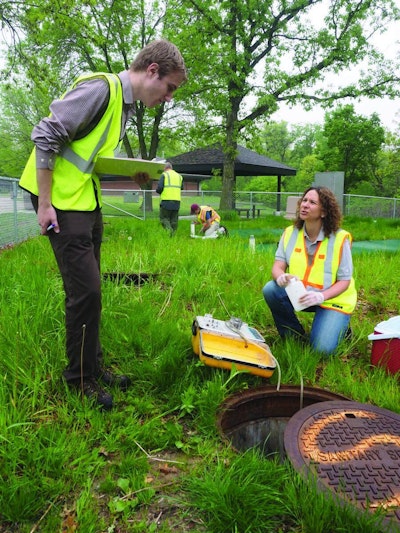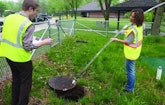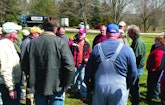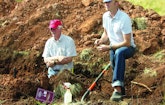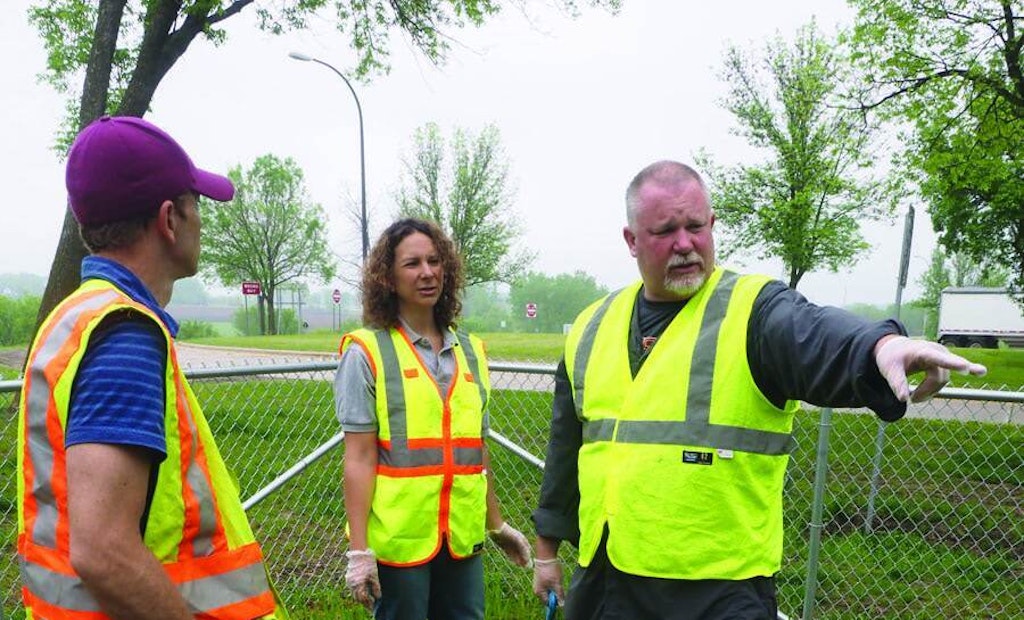
Sara Heger and Dave Gustafson, right, onsite educators from the University of Minnesota, consult on a project.
Interested in WWETT Show?
Get WWETT Show articles, news and videos right in your inbox! Sign up now.
WWETT Show + Get AlertsThroughout my time as editor of Pumper since 2005, I have had the privilege of working with septic system experts from the University of Minnesota through technical collaborations and the Septic System Answer Man column, which has run continuously for the better part of four decades. I believe our readers have benefited greatly from the continuity we’ve enjoyed working with these researchers and educators who ushered in the modern age of decentralized wastewater treatment.
Our first septic expert was Roger Machmeier, who was an Extension Agricultural Engineer at the University of Minnesota. In the pioneer years of septic system design, Machmeier attended one of the first trade shows that grew into the Pumper & Cleaner Expo in New Orleans, shortly after this magazine was founded by Bob Kendall and Pete Lawonn. Before the column came along, he became a fixture training pumpers at the Expo, which moved to Nashville where it became a fixture of the industry.
Machmeier received so many questions about septic service at the shows that in the 1990s, the Answer Man column was born to pass along important information to pumpers. I always thought he was happy to have this outlet to reach thousands of septic professionals beyond those sitting in his training classes. And we were honored to pass along his expertise.
LOOKING BACK
For the 30th anniversary of Pumper in 2009, Machmeier reflected on the progress of the wastewater industry:
“New techniques and products have emerged to enhance the professional services provided by the pumping and onsite system installation industry,” he wrote. “Improved systems and better training have translated into higher quality sewage treatment and better longevity of septic systems for homeowners.
“I believe the mood of the industry has changed to one of contractors showing more pride in their work,” he continued. “I would hope the days of advertisements with sayings like, ‘You dump, we pump,’ are over. Education has given the personnel of service companies a basic knowledge on why the septic tank has to be regularly cleaned and pumped.
“My message to the onsite sewage treatment industry is simple: Keep up the good work. Continue to be a proud professional in your activities with onsite sewage treatment,” he concluded.
Throughout this time period, Machmeier was working hand-in-hand with his University of Minnesota colleague, Jim Anderson, so when it came time for him to retire from the column, it was only natural to turn the job over to Anderson in 2012.
CHANGES COMING
It has been a great pleasure to work with Anderson as he addresses every conceivable issue a pumper could face during daily service routes. Beyond the columns, he remained heavily involved with Pumper & Cleaner Expo training, every year training ballrooms full of contractors from across the country and the world.
He eventually took over as education coordinator for the National Association of Wastewater Technicians, a position he held for many years. From that platform he was able to set training priorities and write courses that helped introduce more modern decentralized wastewater techniques to the pumper community. So like Machmeier, he helped raise the bar of professionalism.
Long retired from the university and off the traveling training circuit, Anderson moved to a lake in northern Wisconsin to spend more time with family. Recently he let me know he was ready to give up Answer Man and I started searching for a new writer to carry on the tradition. Luckily, I only had to look as far as the next link in the University of Minnesota chain of septic educators.
In this month’s issue we welcome Sara Heger, who many of you already know as a researcher and instructor with the Onsite Sewage Treatment Program in the Water Resources Center at Minnesota. She is a certified onsite system designer and service provider, and is past president of the National Onsite Wastewater Recycling Association.
NEW NAME, SAME GREAT CONTENT
With this changing of the guard, it’s obvious we had to change the name of the column. No longer the Answer Man, Heger will be called the Septic Detective. She is still looking for your questions, however, so please feel free to send them to editor@pumper.com and we will pass them along.
Heger is proud to follow in Anderson’s footsteps. As she explains, she was hired by Anderson as a graduate student in 1998 to conduct research related to alternative technology. He was her adviser as she pursued a master’s degree in Water Resource Science, and then served on her Ph.D. committee as she added a doctorate to her credentials. Anderson became her boss at the Water Resources Center.
“He was always supportive of me developing as a professional and serving in leadership positions,” Heger said. “His strong support of our program to teach science-based soils and engineering to septic professionals was steadfast through challenging times at the University. Our program would not be the national leader it is without his leadership and dedication.”
I have a similar thought about the long, beneficial partnership between Pumper magazine and these University of Minnesota educators. We’ve done our best to deliver their important lessons to readers and we hope the columns have been helpful to the pumping community. As always, we welcome your questions, comments and topic suggestions for the Septic Detective.
